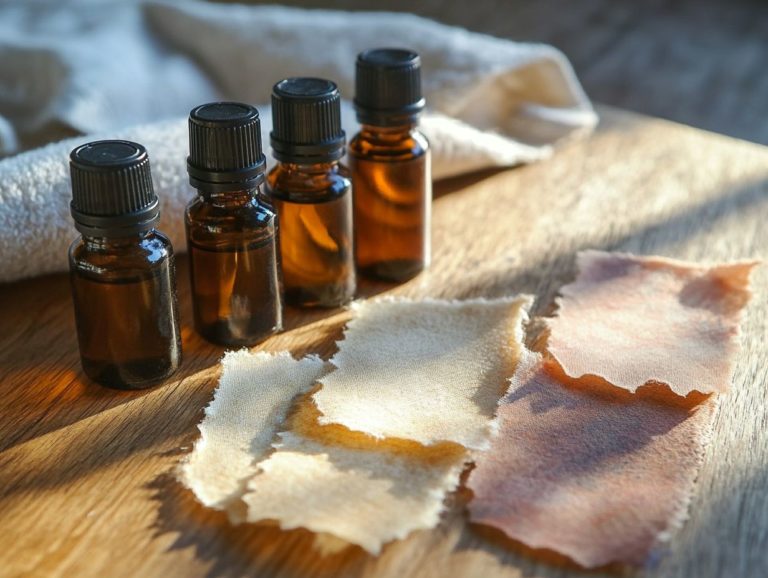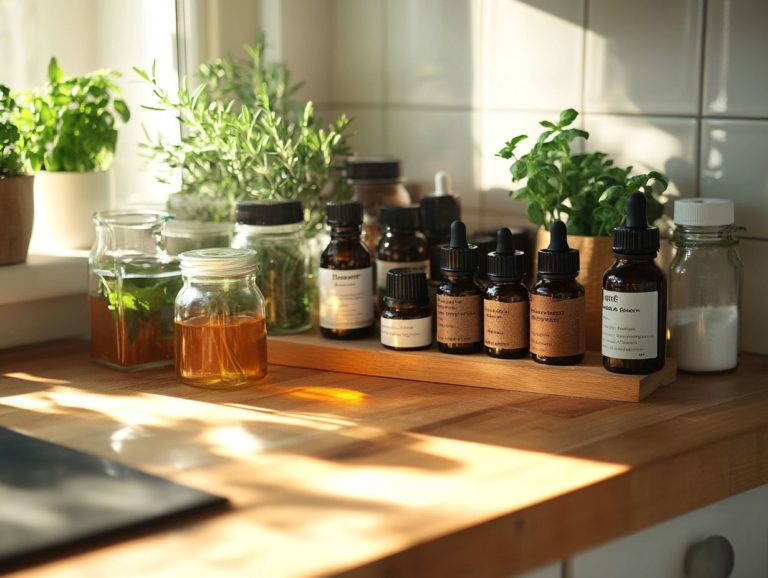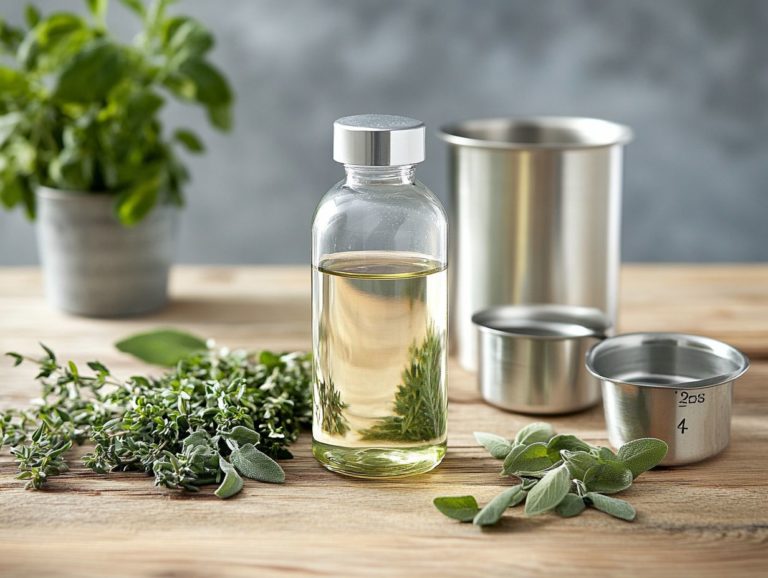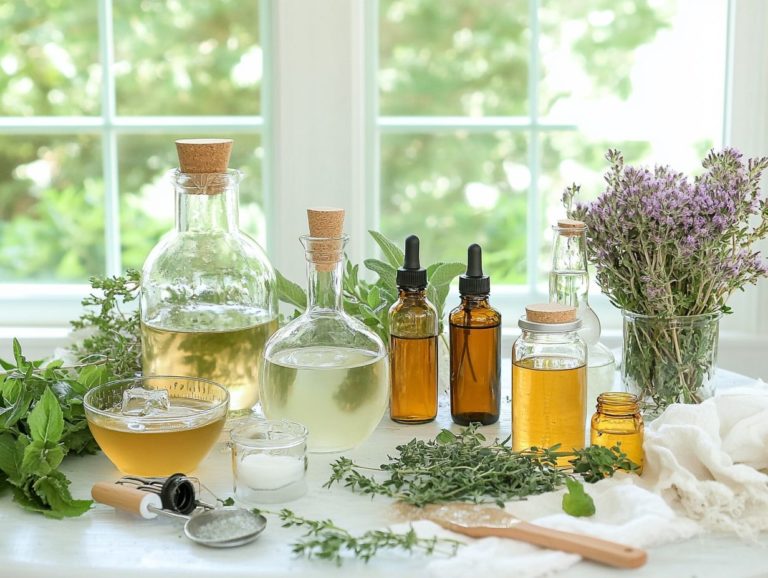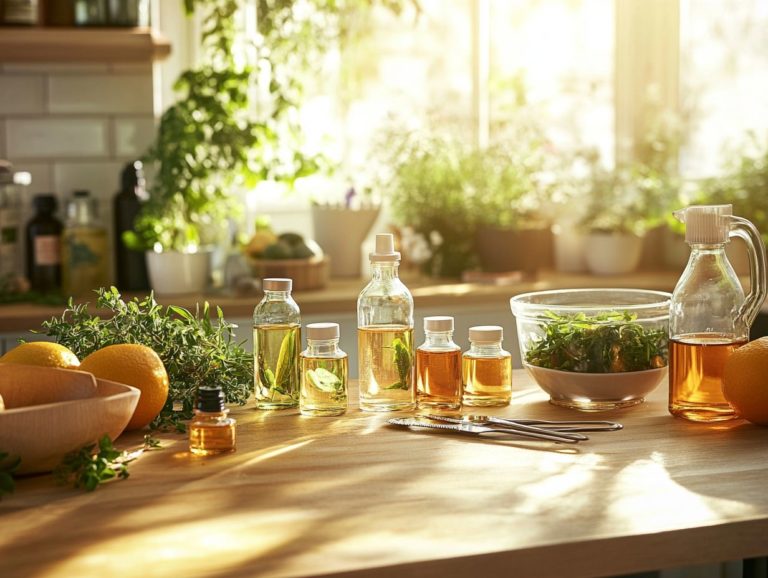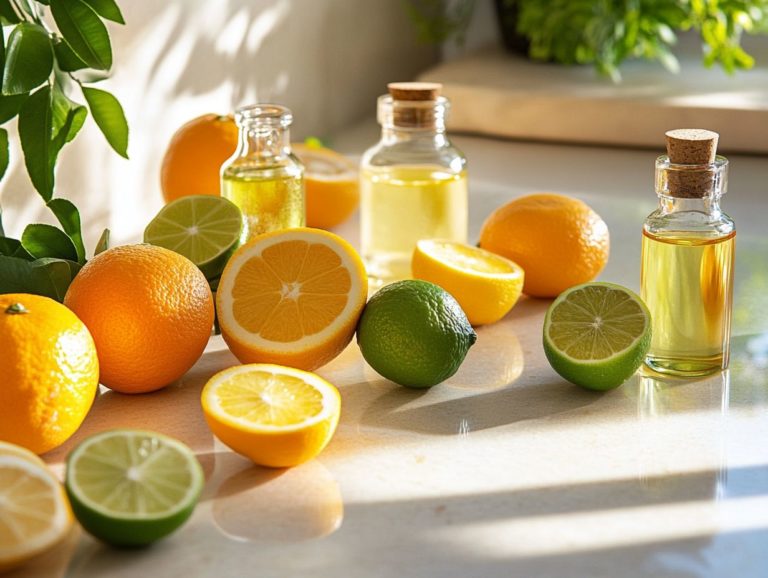The Best Essential Oils for a Clean Kitchen
Transforming your kitchen into a sparkling sanctuary can be achieved without resorting to harsh chemicals. Essential oils provide not only delightful aromas but also impressive cleaning properties. Get ready to discover the top ten essential oils that will revolutionize your kitchen cleaning routine, all while lifting your spirits and enhancing your space. By using pure essential oils from reputable essential oil brands, you can ensure the best results in your kitchen cleaning efforts.
You ll explore their benefits and practical applications for various cleaning tasks. Additionally, you will find essential safety tips and creative ways to integrate them into your daily regimen. Discover how these natural wonders can make your kitchen shine, all while maintaining a fresh and inviting atmosphere! Learning about essential oil safety and potential allergens can help you use them more effectively and safely.
Contents
- Key Takeaways:
- 1. Lemon Essential Oil for Effective Cleaning
- 2. Tea Tree Essential Oil: Natural Cleaning Solutions
- 3. Eucalyptus Essential Oil for All-Purpose Cleaning
- 4. Peppermint Essential Oil for Freshness
- 5. Lavender Essential Oil: Calming and Cleaning
- 6. Rosemary Essential Oil for a Fresh Home
- 7. Thyme Essential Oil for a Healthier Home
- 8. Cinnamon Essential Oil for Warmth and Cleanliness
- 9. Clove Essential Oil for Spicy Freshness
- 10. Orange Essential Oil
- How Do Essential Oils Help with Cleaning?
- How Can Essential Oils Be Used for Different Cleaning Tasks in the Kitchen?
- Frequently Asked Questions
- What are the best essential oils to use for cleaning my kitchen?
- How do I use essential oils to clean my kitchen?
- What are the benefits of using essential oils for cleaning?
- Can I use essential oils on all kitchen surfaces?
- Do I need to use a specific brand of essential oils for cleaning?
- Are there any essential oils I should avoid using in my kitchen?
Key Takeaways:
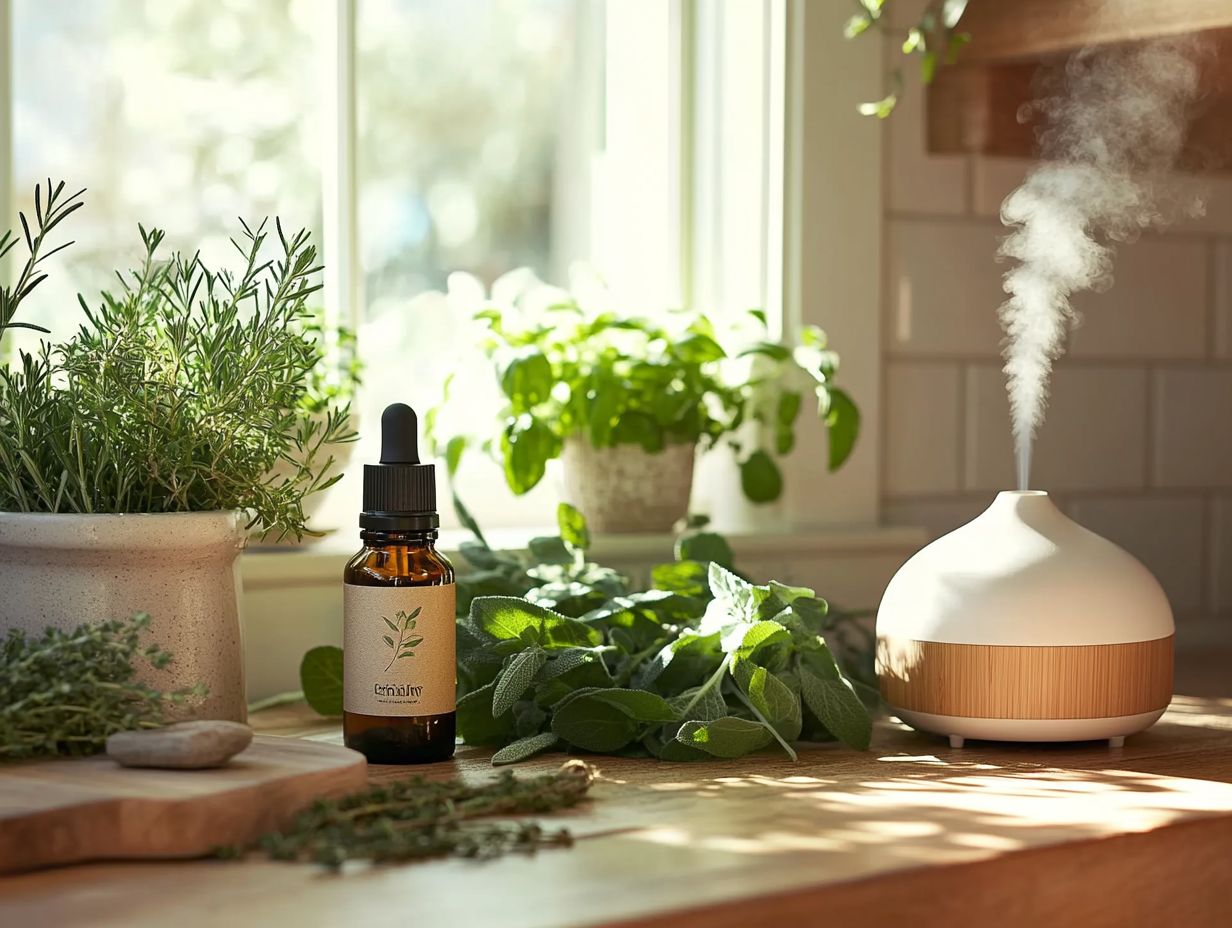
- Lemon essential oil is a powerful natural cleaner that can effectively remove grease and grime in the kitchen.
- Tea tree essential oil has antiseptic and antimicrobial properties, making it great for disinfecting surfaces in the kitchen.
- Eucalyptus essential oil not only has a refreshing scent but also has antibacterial properties that can help keep your kitchen clean and germ-free.
- Using pet-safe essential oils is crucial if you have pets at home to ensure their safety.
- Combining essential oils can create potent blends for enhanced cleaning efficacy.
1. Lemon Essential Oil for Effective Cleaning
Lemon essential oil, celebrated for its invigorating aroma and strong antibacterial properties, is an exceptionally versatile addition to your natural cleaning repertoire. It enhances not only the cleanliness of your space but also uplifts your mood. As one of the top essential oil uses, it s excellent in DIY cleaning recipes and essential oil combinations.
This vibrant oil functions as a natural disinfectant, effectively banishing harmful germs and bacteria while leaving surfaces smelling fresh and revitalized.
When you incorporate it into your DIY cleaning recipes, it stands out as a remarkable alternative to the harsh chemicals often found in commercial products. Its natural acidity effortlessly cuts through grease and grime, making it ideal for kitchen counters, cutting boards, and even bathroom surfaces. Lemon essential oil is popular among natural cleaners due to its strong scent and antimicrobial effects.
By combining lemon essential oil with other essential oils, you can create unique blends that amplify both cleaning efficacy and fragrance. This offers an eco-friendly solution that nurtures your environment and supports your health.
2. Tea Tree Essential Oil: Natural Cleaning Solutions
Tea tree essential oil is revered for its powerful antibacterial properties, positioning it as a strong ally in your cleaning arsenal especially if you prefer natural solutions that are free from synthetic fragrances and harmful chemicals. Tea tree oil is also highly recommended in essential oil research due to its broad range of benefits.
This remarkable oil proves its worth in sanitizing a multitude of surfaces throughout your home. It is particularly effective in kitchens and bathrooms where germs tend to flourish.
With its prowess in combating mold, bacteria, and mildew, tea tree oil excels at wiping down countertops, sinks, and bathroom tiles. This ensures you maintain a cleaner and safer environment.
When you shop at health food stores, it’s wise to select high-quality, 100% pure tea tree essential oil to guarantee maximum effectiveness. Never underestimate the importance of safety; always dilute the oil with water or a carrier oil an oil used to dilute essential oils to ensure safe application. Conducting a patch test is also a smart move to ensure there s no irritation on sensitive skin.
3. Eucalyptus Essential Oil for All-Purpose Cleaning
Eucalyptus essential oil is known for its invigorating aroma and germ-fighting qualities, making it an excellent natural solution for cleaning while also helping with moisture control throughout your home.
Incorporating eucalyptus oil into your cleaning routine can significantly enhance the effectiveness of your all-purpose cleaners. It transforms an ordinary household product into a powerful ally against germs and dirt. Its refreshing scent revitalizes your spaces and improves air quality, creating a more inviting atmosphere. This unique essence not only purifies the air but also offers therapeutic benefits, uplifting your mood and promoting relaxation.
Whether you add it to a DIY cleaner or use it in a diffuser, eucalyptus oil can create balance and cleanliness in any environment. Enjoy a fresher and healthier home today!
4. Peppermint Essential Oil for Freshness
Peppermint essential oil is beloved not just for its invigorating scent that lifts your spirits but also for its powerful germ-fighting qualities. Using concentrated peppermint oil can transform your cleaning experience!
Add this essential oil to your DIY cleaning recipes to effectively target unwanted odors and harmful germs in your home. When combined with natural ingredients like vinegar or baking soda, you can easily whip up an all-purpose cleaner that disinfects surfaces while filling your space with a refreshing fragrance. Peppermint oil is a fantastic choice for tackling tough kitchen messes!
As you wipe down counters or freshen linens, the crisp, minty aroma elevates your cleaning routine, making it more enjoyable. With its antimicrobial qualities, peppermint oil provides peace of mind, ensuring your living environment remains clean and inviting.
5. Lavender Essential Oil: Calming and Cleaning
Lavender essential oil is famous for its calming properties, offering a soothing aroma that transforms your space and effective cleaning capabilities. Known for its ability to fight mold and mildew, lavender oil is versatile for various cleaning tasks.
This delightful oil not only promotes a serene ambiance that lifts your mood but also tackles grime and germs effectively. With its antibacterial and antifungal qualities, lavender essential oil is ideal for DIY cleaning recipes. It s also a key ingredient in essential oil blends for a balanced cleaning approach.
Create an all-purpose cleaner easily by mixing:
- one cup of distilled water
- one cup of white vinegar
- 10 drops of lavender essential oil
This concoction disinfects surfaces and leaves a refreshing fragrance in its wake. For tough stains, mix a few drops of lavender oil with baking soda to form a natural scrubbing paste. This powerful blend is perfect for addressing stains while infusing your home with tranquility.
Ready to make your home fresher and cleaner with these essential oils? Try incorporating lavender oil into your cleaning routine today for a more peaceful home!
Incorporating essential oils into your cleaning routine not only enhances effectiveness but also creates a pleasant atmosphere in your home.
6. Rosemary Essential Oil for a Fresh Home
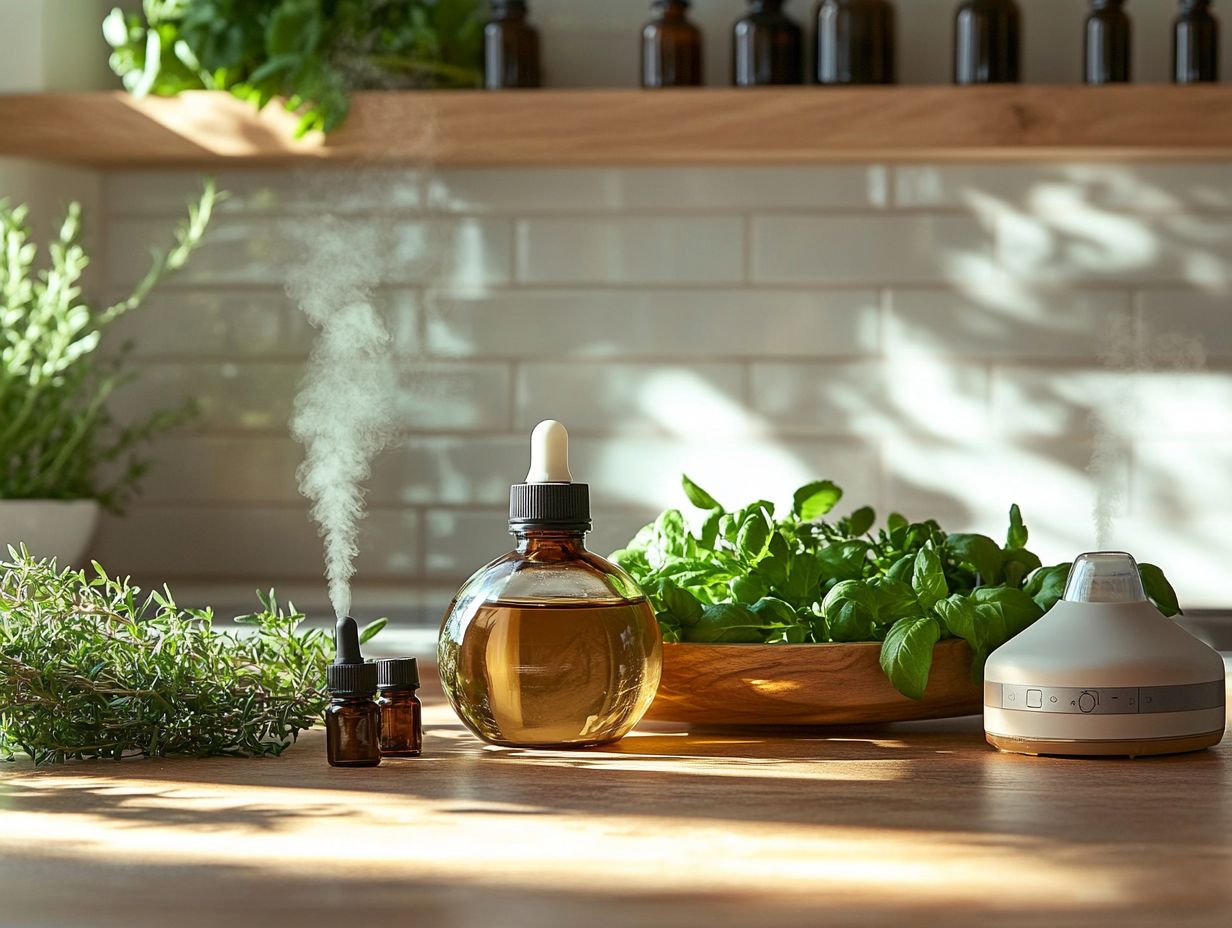
Rosemary essential oil is celebrated for its aromatic and restorative qualities. It boasts remarkable antibacterial properties that enhance the effectiveness of your cleaning solutions. No wonder this oil is a favorite among natural cleaning enthusiasts.
Rosemary oil not only infuses your spaces with a refreshing scent, but it also acts as an effective disinfectant. Whether you re wiping down kitchen surfaces, freshening up laundry, or purifying the air, rosemary oil is a great companion for various cleaning tasks.
Incorporating rosemary oil into your cleaning routine helps eliminate germs and bacteria while uplifting your mood with its distinct, woody aroma. It can lead to improved mental clarity and relaxation, showcasing the dual benefits of embracing herbal remedies. Plus, it ensures your laundry smells delightful!
By integrating rosemary oil into your cleaning practices, you can elevate hygiene and create a healthier living environment.
7. Thyme Essential Oil for a Healthier Home
Thyme essential oil has robust antibacterial properties, making it an exceptional ingredient for your natural cleaning solutions. Incorporate it into your routine to effectively tackle health concerns and create a clean and fresh environment.
This oil not only combats harmful bacteria but also fills your space with a delightful, herbaceous scent that enhances your overall cleaning experience. When mixed with other essential oils, like tea tree or lavender, you create a powerful germ-fighting blend.
To make a simple all-purpose cleaner, combine thyme oil with vinegar and water. This mixture is perfect for wiping down kitchen counters and bathroom surfaces. This powerful mix not only disinfects but also fills the air with a fresh, invigorating scent!
8. Cinnamon Essential Oil for Warmth and Cleanliness
Cinnamon essential oil has a warm and inviting aroma, bringing powerful antibacterial properties to your natural cleaning arsenal. It’s a delightful addition to your cleaning routine.
This versatile oil can be blended with others, like lemon or tea tree oil, to create a potent cleaning solution. When combined with lemon oil, you enhance its cleaning power and infuse your space with a fresh, invigorating scent. Pairing it with tea tree oil creates a strong antibacterial alliance, perfect for disinfecting surfaces in your kitchen or bathroom.
To maximize the effectiveness of these blends, dilute them in water or vinegar. This allows you to harness their full cleansing properties while ensuring a pleasant fragrance fills your home. Using scent diffusers can help distribute these aromatic blends evenly across your living spaces.
9. Clove Essential Oil for Spicy Freshness
Clove essential oil is known for its rich and spicy aroma and ability to fight germs, making it an exceptional natural solution for enhancing your cleaning routines. It is a popular choice in herbal remedies due to its strong antiseptic properties.
Not only does it infuse your spaces with a delightful fragrance, you can easily integrate clove oil into all-purpose cleaners. It cuts through grime and tackles stubborn stains with ease. If you prefer DIY solutions, combine it with vinegar or baking soda to create a powerful yet safe cleaning agent that sanitizes your kitchen countertops and bathroom surfaces effectively.
Beyond its impressive cleaning abilities, clove essential oil offers numerous health benefits, including its potential to alleviate respiratory issues and enhance oral health. This versatility makes it a valuable cleaning tool.
10. Orange Essential Oil
Orange essential oil has an invigorating scent that elevates your mood while providing powerful antibacterial properties. It is an exceptional choice for both cleaning and aromatherapy through scent diffusers.
Transform your kitchen into a vibrant and inviting space with its refreshing aroma, creating an atmosphere that feels both energizing and comforting. When you add this essential oil to your cleaning recipes, it effectively cuts through dirt and grease, leaving behind a delightful citrus fragrance that lingers in the air.
A few drops mixed with vinegar or baking soda can turn into a formidable all-purpose cleaner that effortlessly tackles tough stains. Plus, the scent can help reduce stress, making those kitchen chores feel less like a chore and more like a revitalizing experience.
How Do Essential Oils Help with Cleaning?
Essential oils have surged in popularity as natural cleaning solutions due to their impressive antibacterial properties. They not only provide effective cleaning but also address health concerns often linked to traditional toxic cleaners.
Unlike many conventional cleaners laden with harsh chemicals, essential oils offer a gentler yet equally effective alternative. They can sanitize surfaces without exposing you to harmful substances. Natural oils like tea tree and lavender possess antimicrobial qualities, which are perfect for banishing germs and bacteria.
Creating DIY cleaning solutions with essential oils is cost-effective and allows you to customize your cleaning experience. You can craft unique fragrances that reflect your personal style while minimizing your carbon footprint. By incorporating essential oils into your cleaning routine, you promote a healthier living environment and embrace a more sustainable lifestyle.
What Are the Benefits of Using Essential Oils in the Kitchen?
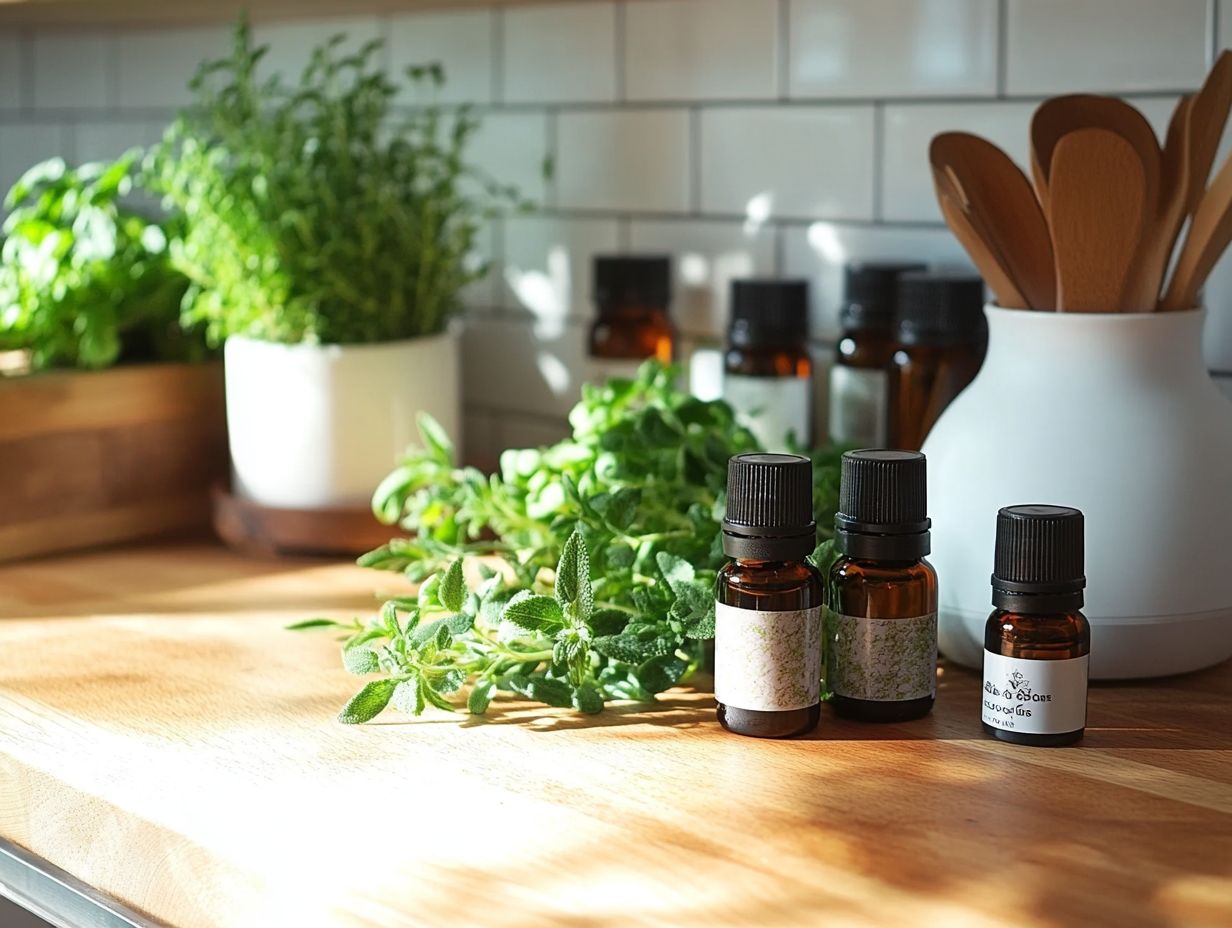
Incorporating essential oils into your kitchen elevates the mood with their enchanting scents and offers remarkable antibacterial properties, creating a clean and healthy cooking environment.
Among the many options available, lemon essential oil stands out for its vibrant aroma and powerful cleansing abilities. Its natural acidity is excellent at breaking down grease and grime, leaving behind a refreshing fragrance that lingers long after you ve finished cleaning.
Tea tree oil, known for its formidable antimicrobial effects, can combat mold and mildew effectively without relying on the harsh chemicals typically found in traditional cleaners.
Consider a blend of lavender essential oil as well. Not only is it soothing, but it also provides impressive protection against bacteria, transforming your kitchen into a tranquil retreat while ensuring every surface remains sanitized.
These essential oils present a safe and effective cleaning alternative, making your kitchen not just cleaner, but also a safer space for everyone who uses it.
How Can Essential Oils Be Used for Different Cleaning Tasks in the Kitchen?
You can harness the power of essential oils for many cleaning tasks in your kitchen. They provide natural solutions that cut through grease and grime while leaving behind delightful aromas.
Tea tree oil has antibacterial properties. It s an excellent addition to your utensil-washing mixture, ensuring your dishes are clean and sanitized. Lemon essential oil can transform your surface cleaning routine. Its natural acidity dissolves tough stains and leaves a refreshing scent.
To create a simple DIY all-purpose cleaner, mix vinegar with a few drops of lavender oil. This blend cleans effectively and infuses your space with a calming fragrance.
Mix baking soda with peppermint oil for a great scrubbing solution. This blend is perfect for sinks and countertops, providing a gritty texture for deep cleaning and a refreshing scent.
Are There Any Safety Precautions When Using Essential Oils for Cleaning?
Essential oils are beneficial, but safety precautions are crucial. Avoid allergens and ensure the oils you choose are pet-safe for a secure cleaning experience.
Proper dilution is key when using essential oils. Mix a few drops with a carrier oil, like coconut or jojoba, to prevent unwanted reactions.
Store oils away from direct sunlight and in cooler temperatures. Clearly label containers to avoid accidental misuse.
For pet owners, choose oils known to be safe, like lavender or chamomile, to protect your furry friends.
What Are the Other Uses of These Essential Oils in the Kitchen?
Essential oils enhance your kitchen by boosting your mood and serving as herbal remedies. Oils like lemon and rosemary can elevate flavors while providing health benefits like improved immunity and aiding digestion.
Peppermint oil promotes alertness and relaxation, making it perfect for creating a calming atmosphere.
Eucalyptus is known for respiratory benefits, while lavender oil soothes stress. These versatile oils enrich your cooking and foster a harmonious living environment.
How Can Essential Oils Be Incorporated into a Regular Kitchen Cleaning Routine?
Incorporating essential oils elevates your cleaning routine. They turn everyday household ingredients into effective, natural solutions that guarantee cleanliness and delightful aromas.
Mix water, vinegar, and a few drops of lemon or tea tree oil for a powerful all-purpose cleaner. It offers disinfecting properties with a refreshing scent.
Schedule cleaning tasks around essential oils for better effectiveness. Diffuse oil in the kitchen while cleaning or add a few drops to your mop water for a lasting fragrance.
Frequently Asked Questions
What are the best essential oils to use for cleaning my kitchen?
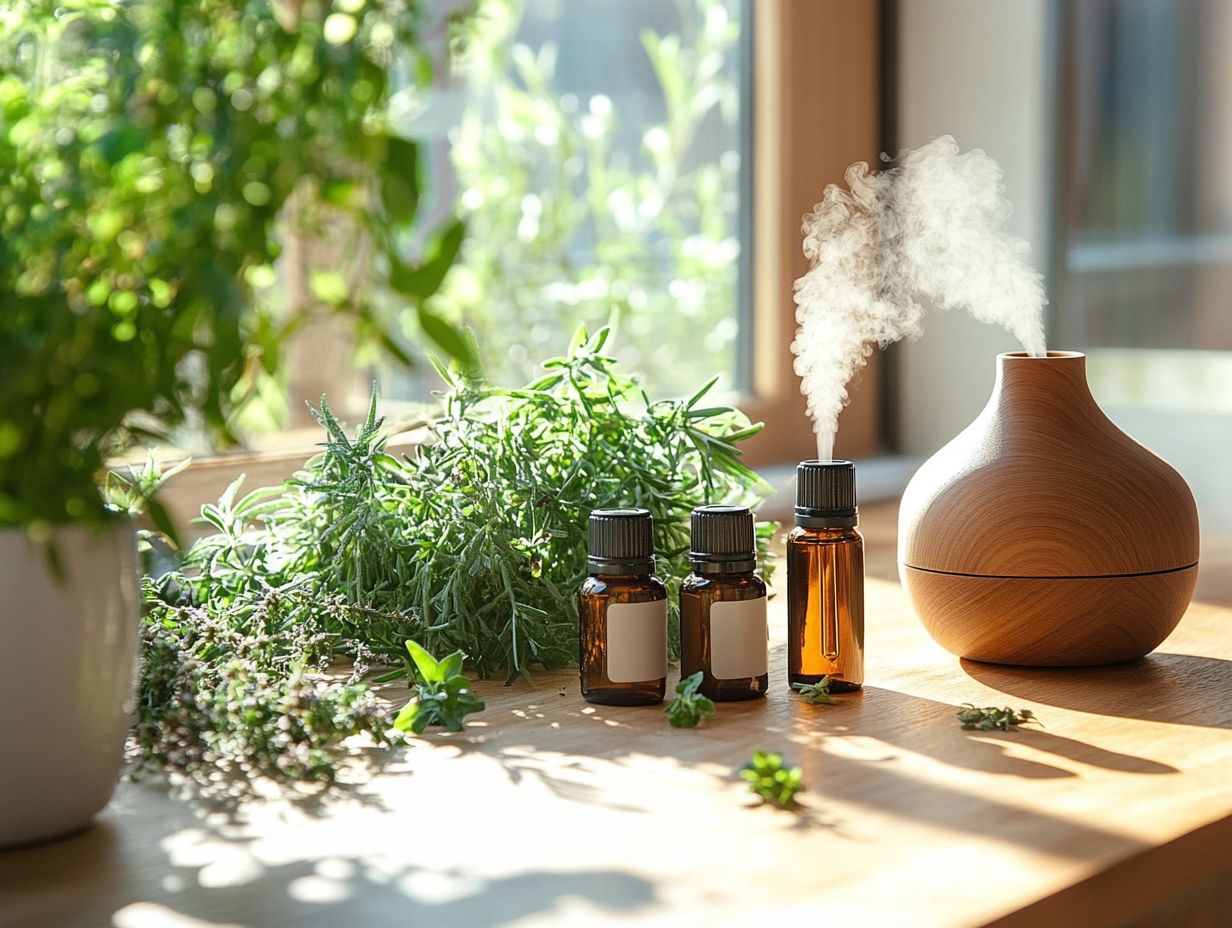
The best essential oils for cleaning your kitchen include lemon, tea tree, peppermint, lavender, eucalyptus, and rosemary. These oils have natural antibacterial and antiviral properties, making them effective cleaners for your kitchen.
How do I use essential oils to clean my kitchen?
You can mix a few drops of oil with water in a spray bottle and use it as an all-purpose cleaner. Alternatively, add a few drops to your dish soap or dishwasher detergent for a fresh scent. You can also use a diffuser to spread the oils in the air and eliminate any cooking odors.
What are the benefits of using essential oils for cleaning?
Essential oils provide a natural and effective way to clean your kitchen. They clean the air and make it smell nice, uplift your mood, and keep pesky insects away. Plus, they are free of harsh chemicals and toxins, making them safer for you and the environment.
Can I use essential oils on all kitchen surfaces?
You can safely use most essential oils on different kitchen surfaces, including countertops, appliances, and floors. However, it’s best to do a small patch test before using a new oil on a large area, especially for sensitive surfaces like marble or granite. Always dilute the oils properly and avoid using them on unfinished or porous surfaces.
Essential oils like lavender oil, tea tree oil, and lemon essential oil are excellent choices for kitchen cleaning due to their antibacterial properties. For more details, check out this guide on using essential oils to clean your kitchen.
Do I need to use a specific brand of essential oils for cleaning?
No, you can use any high-quality, pure essential oils for cleaning your kitchen. Some brands may have specific blends or scents marketed for cleaning. Choose one based on your personal preference. Just make sure to read the labels and avoid any oils with added chemicals or fillers. Brands like Aura Cacia, Now, and Pure Essences offer organic essential oils that are suitable for cleaning solutions.
Are there any essential oils I should avoid using in my kitchen?
Be careful with oils like cinnamon, clove, and oregano; a little goes a long way, and safety should always come first. While most essential oils are safe for use in the kitchen, some may not be suitable for consumption or may irritate the skin. Always consider essential oil safety, especially if you have health concerns or pets. It’s best to do your research and consult a professional before using any new essential oils.

